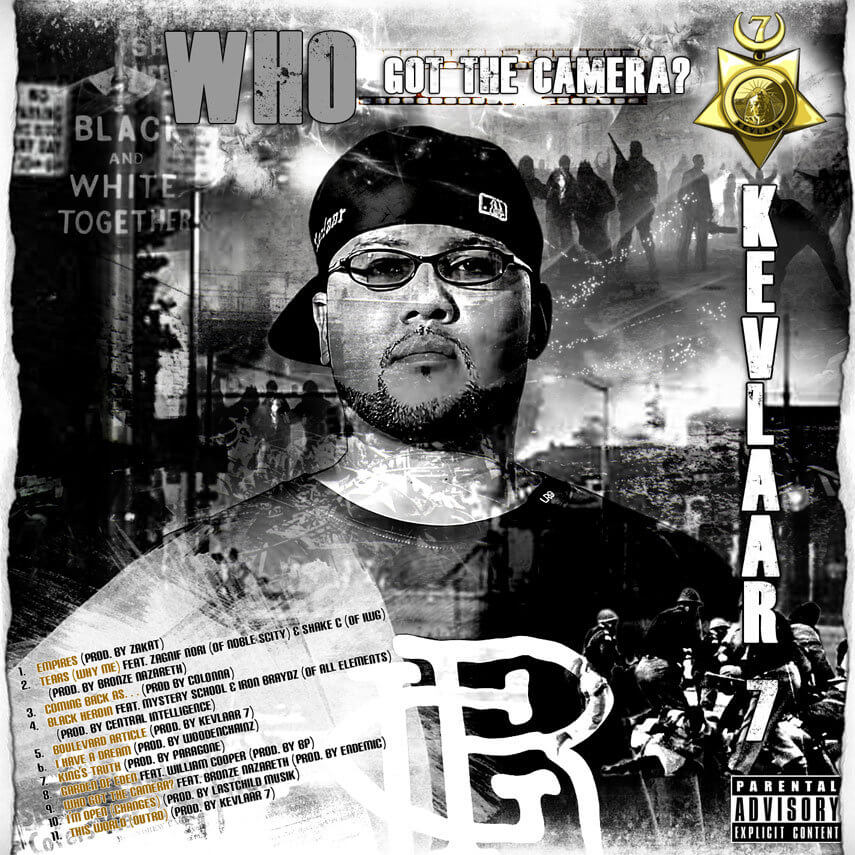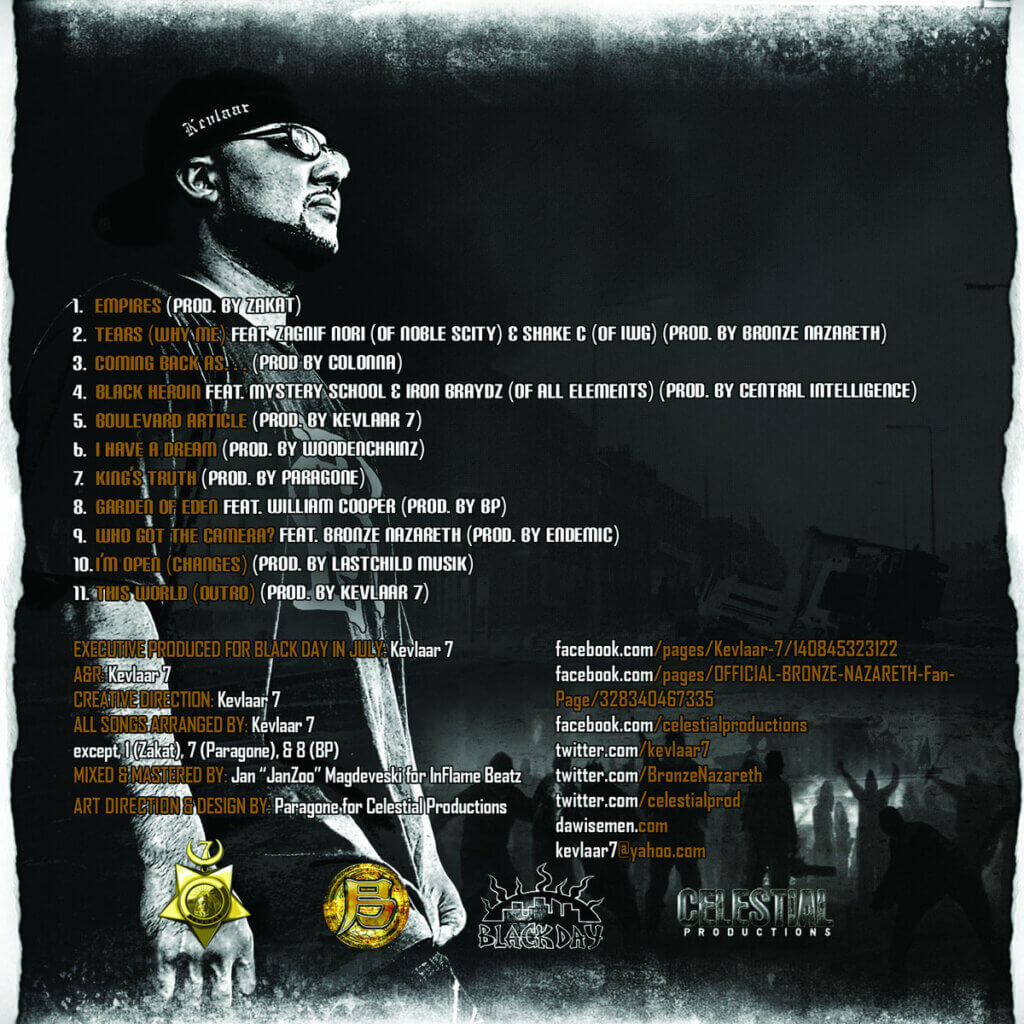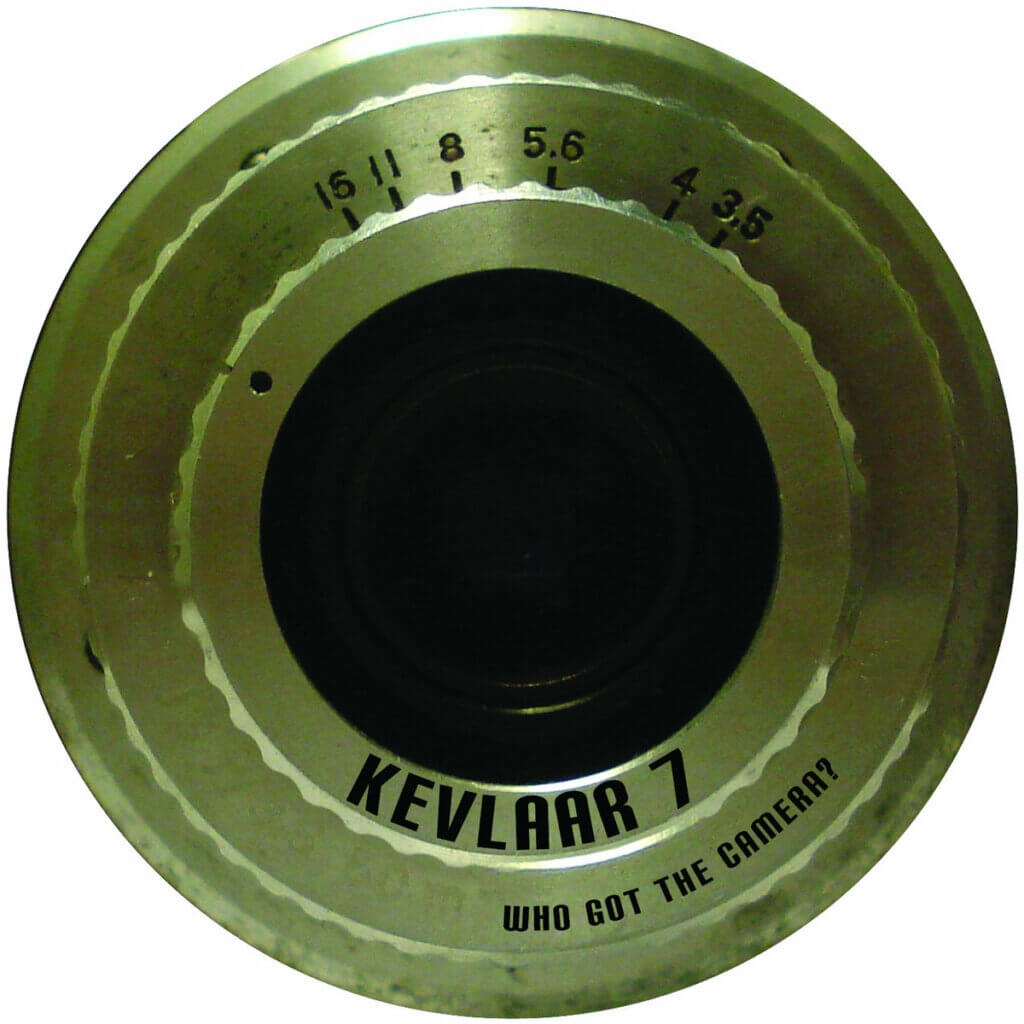Song: Who Got the Camera?
Album: Who Got the Camera?
Performed by: Kevlaar 7, Bronze Nazareth
Produced by: Endemic
“STAND UP! This is a call for justice!” The title track of the 2011 solo debut from Detroit’s Kevlaar 7, the sociopolitically furious “Who Got The Camera?” is a rallying cry, a call to arms, an impassioned jeremiad. It’s a warning from the most tuned in antennas of the times, the brothers Kevlaar 7 (RIP) and Bronze Nazareth of the Wisemen, exposing the brutal corruption of police aggression, the prison industrial complex as new slavery, and the urgent need for waking up and mass demonstrations in a song from four years before the Black Lives Matter movement.
To close the song, Kevlaar—who declares “If this offends you, it’s meant to. It’s that simple”—mourns a dreadfully long list of people who’ve been killed or brutalized by the police, including “Little Aiyana Stanley Jones, an innocent 7-year-old girl who was murdered in her sleep” when Detroit Police shot a flash grenade into her home, raiding the wrong house. They killed an innocent child, then covered it up and were unpunished, even though A&E cameras had filmed the whole thing for their “First 48” documentary show. Kevlaar asks, “So does it really matter Who Got the Camera?”
The song features a guest verse from Bronze, his only appearance on the EP, delivering a righteously enraged and incredibly artful dissection of the roots of racism, revealing its current manifestation in America’s epidemic of police brutality incidents. He outlines the clear resonances of our current racial climate as a continuation of the sequestered historical American roots of slavery. The verse is framed through his own personal experience, his own suffering.
While the title “Who Got the Camera?” was inspired by the Ice Cube track of the same name and similar theme, it takes on new meaning now since we have seen that the strongest tool against state-sanctioned racial violence has proven to be the camera. Capturing police violence on camera and spreading it on social media has been as strong a catalyst for awakening the populace as anyone could imagine. The video of George Floyd’s murder was undeniably disgusting and evil, the footage has sparked a global awakening, the results of which are only beginning to unfold.
[Hook: Kevlaar 7]
Stand up!! / This is a call for justice
Breathe!! / Come on ya’ll / witnesses cluster
Move and scatter/ they shooting!! / Do it really matter?
When they acquitted / who the f*** got the camera?
[Verse 1: Kevlaar 7]
I’mma show you that time is more priceless
Than diamonds when your life is
On the line
it’s the thin line between death and lifers
In the wake of George Floyd’s murder, what felt so foul was the 8 minutes and 46 seconds of time while the officer kneeled on his neck until he died. During that whole time, bystanders tried to intervene and were fought off and threatened with pepper spray. During that time which Kevlaar describes here as “more priceless than diamonds when your life is on the line,” George Floyd in his final moments pleaded with the officer to let him breathe and called out for his dead mother as he was choked to death. Kevlaar in these opening lines seems to be evoking “when your life is on the line” as the threat of violence from the police taking your life in their hands. It also sounds like he is saying, when facing the threat of death from the oppressive defenders of the status quo, it may come down to having to fight for your life. Because then in the next lines, he says there’s a thin line between death and “lifers” serving life in prison, which could be a prison sentence for having fought back in a confrontation where his life was endangered.
Yearning for hope, but in the process they shoot
Clocks merit the loot, freedom in the booth, priceless
If this offends you, it’s meant to, it’s that simple
“Yearning for hope but in the process they shoot”—a prisoner doing life can at least yearn for the hope of parole, and we can yearn and hope for America to repair its epidemic of police violence and systemic racism, but Kevlaar says the system is so flagrantly vile as to cut you down when you yearned for peace, to cut off someone’s life in a law enforcement encounter, to become judge, jury, and executioner. That would be the aforementioned thin line between an officer of the law ending your life and the law locking you in prison for life.
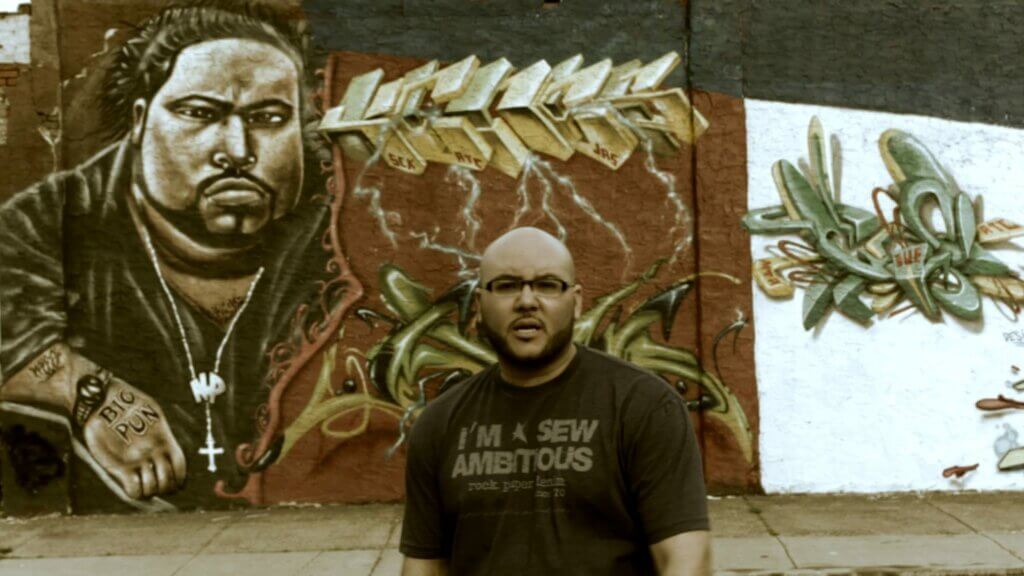
Kevlaar 7
As the title track of this vehemently outspoken sociopolitical album, this song is a reaffirming of everything the album represents, a fierce defense of itself. The message celebrating its own freedom of speech, “freedom in the booth, priceless”—it’s from the pulpit of the recording booth that he announces his unapologetic attitude on this album: “if this offends you, it’s meant to, it’s that simple.”
That line “clocks merit the loot” suggests a lot of meanings in a short phrase. The presence of the word “loot” resonates with the looting we’ve seen recently, whether the poor grabbing merch out of department stores or the corporate elites and bankers robbing the American people, building more piles of wealth amidst a recession and maintaining the oppressive system of inequality. I think Kevlaar evokes both of those meanings herein that “clocks merit the loot” suggests time has been on the side of “the loot” or the money stacks of the rich and powerful, and they have benefited from a legal looting where the systemic racism throughout history gives merit to “the loot.”
Trying to wipe me from ya’ll memory
Ya’ll is post mortem, I’m etched in history
Self-worth, i’mma take a hit like Jesus did
At least I know that I represent the realest s***
Here is Kevlaar fearless and vociferous in defense of the approach he brought to this album. He’s saying he knows that speaking truth to power could get him killed, but he’s ready to “take a hit like Jesus did” and die for a cause. Etching a lasting imprint on history was an enduring theme in Kevlaar’s rhymes, here he seems to invoke this ageless presence in history as being the reason why he would devote his music to the very timely cause of freedom, justice, and equality, while potentially putting his life on the line to do so. Because “at least I know that I represent the realest s***.”
Monopolize the news, feeding us toxins
Watch it, don’t be boxed in, criminalizing blackness
A half dozen giant corporations now hold ownership over the vast majority of the news media and can thus monopolize the flow of information, they can also feed viewers toxic viewpoints and sway public opinion. Kevlaar brings this up in what sounds like an exasperated question, like, now you monopolize the news? Really?
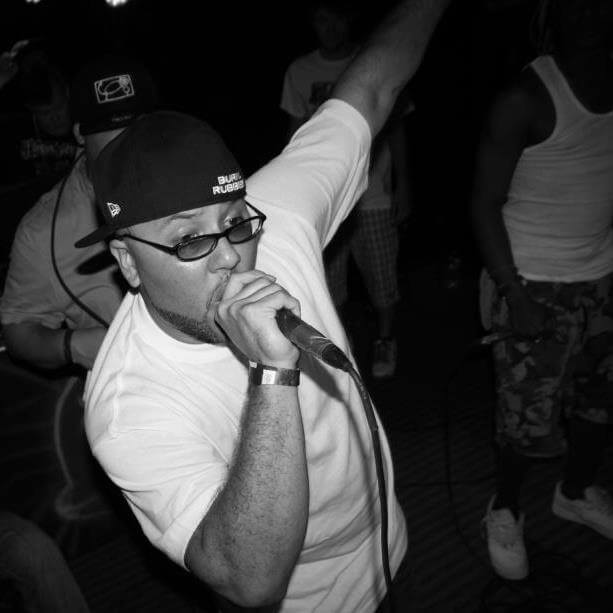
Kevlaar 7
That next line is a warning: “watch it, don’t be boxed in, criminalizing blackness.” Watch it, or watch out, be aware and also watch the television but don’t get boxed in, don’t let the TV shape your perspective so much that they’ve got you criminalizing blackness. This feels like a rebuke of the media’s habit of attempting to smear victims after they’ve suffered from police violence, trying to sway the opinion with character assassination until they view the victim as a criminal simply for being black in America. Also, this is derived from the years of ‘Cops’ and ‘Live PD’-esque shows, showing minorities involved in police incidents as if to underpin the false belief that minorities are inherently criminal. This is how the media helps drive the narrative and helps the powerful avoid accountability.
Truth to power, flowers blossom, Reaganomics
Black roses are so honest, You’ll understand when i’m dead
Trapped wherever I am
What Kevlaar seems to be getting at in these lines is you reap what you sow. Black history in America has for centuries been about oppression and violence, the historical roots of today’s systemic racial injustices. Kevlaar on this album was intent on speaking truth to power in order to bring about future change. He is also saying here, “You’ll understand when I’m dead” which is surreal now looking at this 2011 track from an artist who died in 2014, in the context of a society in 2020 that has been shaken awake to the brutality of systemic racial injustice. “Black roses are so honest” sounds like he’s saying the seeds sown in the racist policies of the Reagan Era sprouted up many of the societal issues we are dealing with now and there’s no denying it (“so honest”).
Victimized by the feds when
We trying to bring home the bread and life changes
Red dots aimed at nameless so-called perpetrators
Every last one should die ageless
The murders of black people by the police have often been wanton, unprovoked acts of violence against people simply trying to live their lives. This is what he is describing here with “red dots aimed at nameless so-called perpetrators”—guns being aimed and fired haphazardly, killing innocent people like Breonna Taylor as she was sleeping in the middle of the night. She was someone “trying to bring home the bread and life changes” in other words, a hardworking regular citizen. (That phrase “life changes” echoes the song “I’m Open (Changes)” that appears later on in the album.) It’s the emphasis on taking innocent lives like they’re just collateral damage, and then nobody is held accountable for it. Kevlaar declaring that “every last one should die ageless” is another way of saying their memories should be kept alive to help raise awareness of these issues and fight for justice, just like we’re seeing now with the memorials for George Floyd. “Die ageless” is also a signature phrase from Kevlaar, it was the title of the album he released following this one.
On these pagans, we beg for operations
Seek and destroy, the barrels flaming
Bathing in iniquity, this is my soliloquy
To me and my people
“The barrels flaming” echoes the chorus line “they shooting.” And “bathing in iniquity” is a perfect encapsulation of where we are as a society. America is drowning in a sea of corruption and injustice at this point after decades of extrajudicial killings by the police, with little to no accountability, all with the backdrop of an out of control justice system where the prison industrial complex locks up more people than any country on earth. That Kevlaar felt the need to speak out so strongly about these issues, back in 2011 no less, is admirable and inspiring.
Thru my words
I’m trying to physically reach you
Prince of the kingdom, bringing this war
To the forefront God, I should have BEEN warned ‘em…
When I first reviewed this album I wrote “this record is an attempt at social change through musical telekinesis.” Using his words and his music, Kevlaar was “trying to physically reach you” or trying to transcend time and space and transform the listener. He saw this album as his way of stepping up to the front lines with a megaphone, speaking truth to power and issuing a loud warning to the populace.
[Verse 2: Bronze Nazareth]
I write on the same trees, where strange fruit hung
With the same pencil, chiseled from where the axe swung
Bronze’s work has always featured a strong message on the historical arc of racial strife but it is rarely as concentrated as here. His verse spans history and exposes the gravity of the current moment in time. It’s extremely powerful, raw in its honesty, and ripe in poetry right from the opening bar.
Immediately making clear the verse’s theme, Bronze directly connects his life and his art with the brutal history of racism. The pages he writes on were cut from the same trees that hung victims of lynchings, alluding to Billie Holliday’s dark classic “Strange Fruit” from the not-that-long-ago lynch-heavy era of the 1930s.

Bronze Nazareth
The tangible modern manifestation of strange fruit becomes Bronze writing “With the same pencil, chiseled from where the axe swung.” Beyond what it even specifically means, it’s got a vicious sound to it. The pencil he writes with stems from wood chopped by slaves, or from the same branch they chopped the noose rope down from.
Wearing the same cotton we got squatting before the gin
Ate off plates from The Amistad who made the day spin
Further developing the theme of current echoes of slavery, the clothes he wears have been weaved out of “the same cotton we got squatting before the gin.” Look up Eli Whitney’s invention, you’ll see images of slaves working at the cotton gin. The reference to The Amistad is part of a litany of historical bombs dropped throughout the verse. The slave ship Amistad en route to Cuba in 1839 was overtaken in rebellion by its South African captives.
Much like the song’s second line, the fourth line “Ate off plates from The Amistad who made the day spin” is a resonant bar of poetry, evoking many possible references. One of which is the spinning plates or discs of his music. The image of a slave ship traveling the Atlantic here also introduces a recurring symbol in the verse, the slave ship and “the deep blue sea.”
From the same shackles they put Kunta Kinte in
They just polished now, dangling from the hips of blue men
Who couldn’t grant Oscar life but only 2 years in
Clear sin, lay hidden like Emmett Till’s justice
Here the verse begins to invoke police brutality and the prison system, the lethal combination maintaining modern-day slavery in Black America. The US has the largest prison population in the world and that population is mostly black. Black people are also overwhelmingly the victims of police killings in our nation which kills more of its citizens than any other country.
Bronze equates the slave chains of Kunta Kinte from Roots with the shiny metal handcuffs “dangling from the hips of blue men,” the police who killed Oscar Grant when he was handcuffed. As always, Bronze is able to summon so many references and ideas in just a couple bars. His drawing attention to the murder of Oscar Grant is sharp writing. The cop who shot Oscar Grant as he lay face down “couldn’t grant Oscar life.” It’s both a pun on Grant’s name and written to have a double meaning—the system couldn’t let Oscar live but it also couldn’t grant Oscar the justice of his murderer going to prison for life. Instead his killer, Johannes Mehserle, was sentenced to “only two years in.”
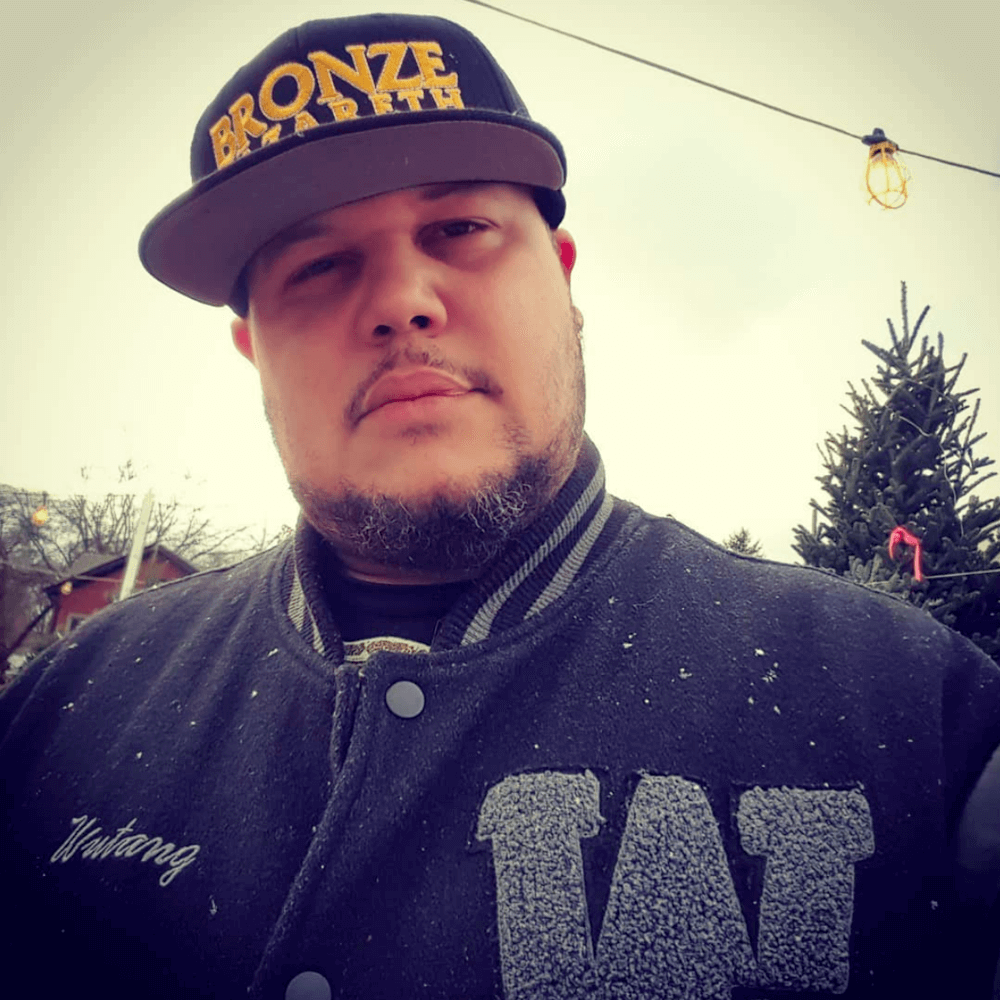
Bronze Nazareth
Again exposing the modern-day continuation of America’s racist past, Bronze compares the injustice of Oscar Grant’s unpunished murder to the slaying of Emmett Till, a 14-year-old whose killers walked free in 1955. As the chorus goes “they shootin, do it really matter? When they acquitted?”
From legal gun busters, slices to snuff out our luster
Prisons with brothers cramped like slaveship clusters
The “legal gun busters” are those in law enforcement who kill with impunity, with the backing of the racist criminal justice system, serving to “snuff out our luster” or dampen the shine of Black Americans.
The second line is the most powerful bar in the song. Certainly the one that’s always stuck with me. “Prisons with brothers cramped like slaveship clusters.” What more can be said?
Sailing on a sea of tears from D. Henry mothers
Held hostage, handcuffed to dreams we can’t get
Drawing a dreary illustration of a prisoner-filled, overcrowded slave ship, it sails on a sea of tears pouring from the mother of DJ Henry, 20-year old student of Pace University (my alma mater), another young black man killed by a cop who was not indicted for the murder.
Bronze manages to sum up the whole history of slavery in just a few bars then describes its modern manifestations in one line: “Held hostage, handcuffed to dreams we can’t get.” Descendants of slaves who were captured and brought here, Black Americans remain held hostage, overwhelmingly brutalized and handcuffed. There’s also the suggestion that Black America is handcuffed to unreachable dreams of prosperity, luxury, wealth through the force-fed images of mainstream hip hop. Even the modest dreams of equal rights, justice for innocent people being murdered, are made to seem unreachable.
Officer Jeffrey Cotton modern day Confederate
Robbie Tolan almost home when the sarge’s shells laced him
Another in a seemingly endless list of examples where an innocent black man was shot with no punishment for the assailant. In 2008, Robbie Tolan, son of baseball player Bobby Tolan, was confronted by police in his own driveway, under the suspicion that Tolan was driving a stolen vehicle that in fact belonged to him. In an ensuing altercation, Tolan was shot in the chest and nearly died. Of course, there were no charges against the shooter, Officer Jeffrey Cotton, whose surname resonates with the themes of the verse.
Something in the precinct’s irrigation
And in that deep blue sea we drown before our litigation
A poetic way of saying there must be something in the water police are drinking to make them so aggressive. The symbol of the sea, the ocean crossed by slave ships, the sea of tears from mourning mothers, now blends into the deep blue sea of “the precinct’s irrigation” which drowns the hopes of Black Americans.
G****** yall! Who got Who Got the Camera?
They said I’m reaching, need a dashboard Samsung
He clapped off but his jammed gun wouldn’t blast
I handed him my wallet and he still took my cash
Called it a drug proceed, but only my music dope
Battered hope, slammed me on the blue cruiser slope
My people got fear and we know you’d rather use rope
The frustration built up throughout the verse culminates in “G****** yall!” as Bronze now relates his own story of being confronted by aggressive cops. He describes being pulled over by an officer who accuses him of reaching for a gun and responds by trying to shoot him but the gun jammed. The scene he paints here feels eerily predictive of what happened in 2016 to Philando Castile. A cop confronted Castile in his car and fired his gun when Castile was reaching for his wallet, killing him. The question Bronze asks, “Who got Who Got the Camera?” suggests many things, including a meta-promo for the titular song and EP, but in the Philando Castile context it could refer to Castile’s girlfriend Diamond Reynolds who filmed the whole harrowing incident on Facebook Live for the whole world to see.
The confrontation Bronze describes shows him uneasily handing over his wallet, but the cop, who already falsely accused him of reaching for a gun, now takes his money, accusing him of drug possession. Bronze responds that the only dope he possesses is his music. He’s thrown into the blue police cruiser, regardless. “Slammed me on the blue cruiser slope” makes me think of Freddie Gray, the young black man in Baltimore who died in the back of a police van in 2015 when they purposely left him unbuckled and intentionally drove so violently, their handcuffed passenger slammed around til his spinal cord was severed. That final line sums up the song’s message of the tragic undertones of lynching interweaved in present-day police aggression, “My people got fear and we know you’d rather use rope.” The modern-day fear of lynching, back to the verse’s opening line describing “the same trees where strange fruit hung.”
[Closing: Kevlaar 7]
This joint is dedicated to all who were murdered, or victims of police brutality, and misconduct…
Joseph Erin Hamley
Oscar Grant
Juan Herrara
Javier Ovando
2Pac Shakur
Rodney King
DJ Henry
Kathryn Johnston
Malice Green
Timothy Stansbury
Amadou Diallo
Sean Bell
Aaron Campbell
And of course Detroit’s own…Ayianna Jones. A little innocent 7 year old girl who was executed in her sleep, in the early morning hours of May 16th 2010, when the DPD fired into the home from outside, threw a flash grenade into the home, and raided the wrong apartment; only to find they murdered an innocent little girl while she was sleeping…then covered it up, all while A&E cameras were rolling…so do it really matter? Who got the camera?
Peter Quadrino grew up in Staten Island, NY where his love of Hip Hop music was ingrained during the ’90s Golden Era of NYC rap. He writes about Hip Hop, sports, and literature at the blog “A Building Roam” (www.abuildingroam.com) and also writes about the author James Joyce at his blog “Finnegans, Wake!” (finwakeatx.blogspot.com). He lives in Austin, TX.
Bronze Nazareth is an international underground Hip Hop artist and producer who hails from Detroit, MI. Bronze was picked up by RZA as a Wu-Tang producer in 2002. He has worked with the Wu-Tang Clan, Canibus, Royce da 5’9, and many more notable acts. In 2019, he released “Gravitas” a collaboration with KXNG Crooked. He has multiple solo albums dropping in 2020.
Kevlaar 7 was a Hip Hop artist and producer from Detroit, MI. His body of work includes multiple albums with his group The Wisemen, and several solo projects including the critically acclaimed 2011 EP “Who Got the Camera?” and 2012 collaboration with producer Woodenchainz “Sophisticated Movement.” Kevlaar 7 passed away from a rare blood disorder on December 23, 2014.
